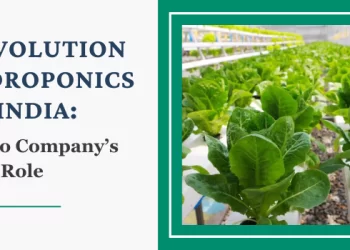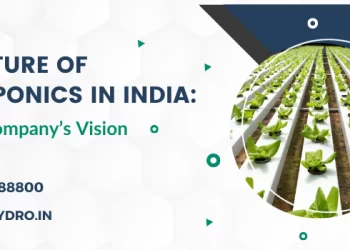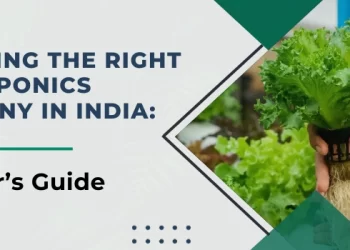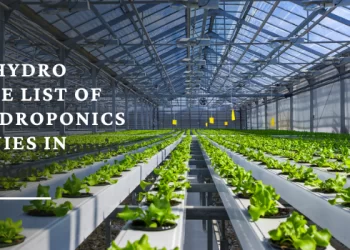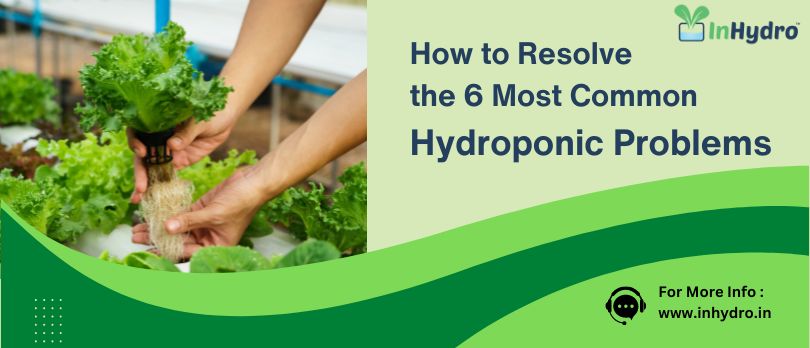
How to Resolve the 6 Most Common Hydroponic Problems
If you are a hydroponic gardener, you know that there are some common problems that can occur in your hydroponic system. From nutrient deficiencies to nutrient lockout, these problems can be frustrating and hard to resolve. Fortunately, we have compiled a list of the 6 most common hydroponic problems and the best solutions for resolving them. In this blog post, we will discuss each problem in detail and provide helpful tips for resolving them quickly and efficiently. Read on to learn more about resolving the most common hydroponic problems!
- Poor aeration
Poor aeration is one of the most common problems faced by hydroponic farmers, particularly those just starting out with their Hydroponic farming setup in India. Poor aeration can occur when there is insufficient air circulation within a hydroponic system, meaning that the plants are not getting enough oxygen to grow and thrive. Without enough oxygen, plants will experience stunted growth, wilting leaves, and even death in some cases.
To avoid this problem, hydroponic farmers should take steps to ensure adequate air circulation in their setup. This includes ensuring that air pumps are properly placed and functional, as well as regularly checking for any blockages that may prevent air from moving freely throughout the system. Additionally, maintaining a regular maintenance schedule for your system is essential to ensure its optimal functioning. By taking these steps, hydroponic farmers in India can avoid poor aeration and keep their plants healthy and thriving.
- Too much or too little water
One of the most common problems encountered in hydroponic farming is too much or too little water. This can be caused by many things, such as too little air in the hydroponic system, changes in temperature, or a blocked water supply line. Too much water can cause waterlogging and a buildup of salts, while too little water can lead to nutrient deficiency and wilting.
To prevent this problem, hydroponic farmers need to monitor the moisture level of their hydroponic systems regularly. Additionally, Hydroponic Farming Startups in India should make sure that their systems are well aerated with proper drainage and that their nutrient solutions are balanced and not too concentrated. If there is an issue with the water supply, it should be addressed as soon as possible.
- Inconsistent nutrient levels
One of the most common problems faced by hydroponic farming startups, particularly in India, is inconsistent nutrient levels. When nutrients are not evenly distributed throughout the growing medium, plants can suffer from stunted growth and even death. This can happen when the pH level is not maintained correctly, or if the fertilizer mix used is incorrect for the plant variety. To avoid this issue, it’s important to monitor the pH and nutrient levels regularly, and make sure that the fertilizer mix used is appropriate for the crop being grown. Additionally, it’s a good idea to keep a record of each fertilizer mix used for each crop so that if an issue does arise, it can be quickly identified and rectified.
- Pest infestations
Pests can be a major issue for hydroponic farmers, especially in India where the humid climate provides an ideal environment for them to thrive. If a pest infestation is allowed to go unchecked, it can wreak havoc on a hydroponic farming startup, resulting in crop loss, disease, and contamination.
The most common pests associated with Hydroponic farming in India are aphids, mites, thrips, and whiteflies. These pests can be difficult to spot and will often feed on the roots and leaves of plants. In order to combat this problem, hydroponic farmers must employ strict sanitation protocols and regularly inspect their crops for signs of infestations.
It is also important to use a pest control method that is both safe and effective. There are a number of natural remedies available that can help control pests without harming the plants or other beneficial insects. Examples include using neem oil, ladybugs, and bacillus thuringiensis (BT). Alternatively, chemical pesticides can also be used if necessary.
By implementing these measures and staying vigilant for signs of pests, hydroponic farmers in India can ensure that their operations remain free from harmful infestations.
- Poor drainage
Poor drainage can be a major issue for hydroponic farming in India. Without proper drainage, the root system of your plants can become waterlogged, leading to root rot and other problems. In addition, poor drainage can cause issues with nutrient uptake, as the plant roots don’t have enough oxygen to absorb the nutrients. To ensure your Hydroponic setup is well-drained, consider using growing media such as clay pebbles, perlite, or Rockwool cubes. Additionally, you may need to adjust the pH of your nutrient solution to ensure that it is well-balanced and the roots can take up the nutrients properly. Finally, make sure to check for any clogged drain holes or blockages that could be preventing proper drainage. By taking these steps, you can make sure your hydroponic setup is well-drained and your plants will thrive.
- Lack of light
Lack of light is a common problem faced by hydroponic farmers in India. This can lead to stunted growth, yellowing leaves and plants that produce less than expected yields. To prevent this from occurring, hydroponic farmers in India should ensure that their plants are receiving adequate lighting. This can be done by providing enough natural light or supplementing with artificial lighting such as grow lights. It’s important to consider the specific requirements of the plants being grown and adjust the lighting accordingly. Adequate lighting is essential for a successful hydroponic farming operation in India.
- Conclusion
Hydroponic farming is quickly becoming a popular form of agriculture in India. The benefits of this method of farming include increased yields, efficient use of resources, and improved water conservation. While there are many advantages to hydroponic farming, there are also some potential problems that may arise during the process. However, these problems can be easily resolved with some careful monitoring and maintenance. By taking the necessary steps to diagnose and address any hydroponic issues, farmers in India can maximize their crop yields and ensure a successful hydroponic farm. With proper care and attention, hydroponic farming can be a great way to grow fresh and nutritious produce in India.
Also Check:- The Benefits of Hydroponic Farming
Thank you for your interest in InHydro! Whether you have questions about our hydroponics products, services and solutions or want to learn more about hydroponics, we’re here to help. Please feel free to reach out to us using the contact information below, and one of our friendly team members will be in touch with you shortly.

How to Resolve the 6 Most Common Hydroponic Problems
If you are a hydroponic gardener, you know that there are some common problems that can occur in your hydroponic system. From nutrient deficiencies to nutrient lockout, these problems can be frustrating and hard to resolve. Fortunately, we have compiled a list of the 6 most common hydroponic problems and the best solutions for resolving them. In this blog post, we will discuss each problem in detail and provide helpful tips for resolving them quickly and efficiently. Read on to learn more about resolving the most common hydroponic problems!
- Poor aeration
Poor aeration is one of the most common problems faced by hydroponic farmers, particularly those just starting out with their Hydroponic farming setup in India. Poor aeration can occur when there is insufficient air circulation within a hydroponic system, meaning that the plants are not getting enough oxygen to grow and thrive. Without enough oxygen, plants will experience stunted growth, wilting leaves, and even death in some cases.
To avoid this problem, hydroponic farmers should take steps to ensure adequate air circulation in their setup. This includes ensuring that air pumps are properly placed and functional, as well as regularly checking for any blockages that may prevent air from moving freely throughout the system. Additionally, maintaining a regular maintenance schedule for your system is essential to ensure its optimal functioning. By taking these steps, hydroponic farmers in India can avoid poor aeration and keep their plants healthy and thriving.
- Too much or too little water
One of the most common problems encountered in hydroponic farming is too much or too little water. This can be caused by many things, such as too little air in the hydroponic system, changes in temperature, or a blocked water supply line. Too much water can cause waterlogging and a buildup of salts, while too little water can lead to nutrient deficiency and wilting.
To prevent this problem, hydroponic farmers need to monitor the moisture level of their hydroponic systems regularly. Additionally, Hydroponic Farming Startups in India should make sure that their systems are well aerated with proper drainage and that their nutrient solutions are balanced and not too concentrated. If there is an issue with the water supply, it should be addressed as soon as possible.
- Inconsistent nutrient levels
One of the most common problems faced by hydroponic farming startups, particularly in India, is inconsistent nutrient levels. When nutrients are not evenly distributed throughout the growing medium, plants can suffer from stunted growth and even death. This can happen when the pH level is not maintained correctly, or if the fertilizer mix used is incorrect for the plant variety. To avoid this issue, it’s important to monitor the pH and nutrient levels regularly, and make sure that the fertilizer mix used is appropriate for the crop being grown. Additionally, it’s a good idea to keep a record of each fertilizer mix used for each crop so that if an issue does arise, it can be quickly identified and rectified.
- Pest infestations
Pests can be a major issue for hydroponic farmers, especially in India where the humid climate provides an ideal environment for them to thrive. If a pest infestation is allowed to go unchecked, it can wreak havoc on a hydroponic farming startup, resulting in crop loss, disease, and contamination.
The most common pests associated with Hydroponic farming in India are aphids, mites, thrips, and whiteflies. These pests can be difficult to spot and will often feed on the roots and leaves of plants. In order to combat this problem, hydroponic farmers must employ strict sanitation protocols and regularly inspect their crops for signs of infestations.
It is also important to use a pest control method that is both safe and effective. There are a number of natural remedies available that can help control pests without harming the plants or other beneficial insects. Examples include using neem oil, ladybugs, and bacillus thuringiensis (BT). Alternatively, chemical pesticides can also be used if necessary.
By implementing these measures and staying vigilant for signs of pests, hydroponic farmers in India can ensure that their operations remain free from harmful infestations.
- Poor drainage
Poor drainage can be a major issue for hydroponic farming in India. Without proper drainage, the root system of your plants can become waterlogged, leading to root rot and other problems. In addition, poor drainage can cause issues with nutrient uptake, as the plant roots don’t have enough oxygen to absorb the nutrients. To ensure your Hydroponic setup is well-drained, consider using growing media such as clay pebbles, perlite, or Rockwool cubes. Additionally, you may need to adjust the pH of your nutrient solution to ensure that it is well-balanced and the roots can take up the nutrients properly. Finally, make sure to check for any clogged drain holes or blockages that could be preventing proper drainage. By taking these steps, you can make sure your hydroponic setup is well-drained and your plants will thrive.
- Lack of light
Lack of light is a common problem faced by hydroponic farmers in India. This can lead to stunted growth, yellowing leaves and plants that produce less than expected yields. To prevent this from occurring, hydroponic farmers in India should ensure that their plants are receiving adequate lighting. This can be done by providing enough natural light or supplementing with artificial lighting such as grow lights. It’s important to consider the specific requirements of the plants being grown and adjust the lighting accordingly. Adequate lighting is essential for a successful hydroponic farming operation in India.
- Conclusion
Hydroponic farming is quickly becoming a popular form of agriculture in India. The benefits of this method of farming include increased yields, efficient use of resources, and improved water conservation. While there are many advantages to hydroponic farming, there are also some potential problems that may arise during the process. However, these problems can be easily resolved with some careful monitoring and maintenance. By taking the necessary steps to diagnose and address any hydroponic issues, farmers in India can maximize their crop yields and ensure a successful hydroponic farm. With proper care and attention, hydroponic farming can be a great way to grow fresh and nutritious produce in India.
Also Check:- The Benefits of Hydroponic Farming
Contact us at the Consulting WP office nearest to you or submit a business inquiry online.
Related Post
-
The Evolution of Hydroponics in India: InHydro Company’s Role
The Evolution of Hydroponics in India: InHydro Company’s Role India, a country with a rich agricultural heritage, is now witnessing a revolution in farming methods – hydroponics. This innovative approach to cultivation has the potential to reshape the Indian agricultural landscape. At the forefront of this evolution is InHydro, a pioneering hydroponics company in India. In this blog, we’ll explore the remarkable journey of hydroponics in India and the pivotal role played by InHydro in this transformation. The Early Stages: Hydroponics in India The concept of hydroponics, which involves growing plants without soil, was relatively unknown in India until a
11/10/2023
Read more -
The Future of Hydroponics in India: InHydro Company’s Vision
The Future of Hydroponics in India: InHydro Company’s Vision As the world grapples with increasing food demands, climate change, and limited arable land, the future of agriculture is undergoing a paradigm shift. In India, where agriculture is a cornerstone of the economy, hydroponics is emerging as a game-changer. InHydro, a pioneering hydroponics company in India, is at the forefront of this agricultural revolution. Let’s explore InHydro’s vision for the future of hydroponics in India. Agriculture Reinvented: InHydro’s Commitment InHydro envisions a future where agriculture in India is not constrained by traditional farming methods and limitations. Their commitment is to reinvent
11/10/2023
Read more -
Choosing the Right Hydroponics Company in India: A Buyer’s Guide
Choosing the Right Hydroponics Company in India: A Buyer’s Guide In the ever-evolving world of agriculture, hydroponics has emerged as a revolutionary method of cultivating crops. Hydroponic farming offers numerous advantages, from efficient space utilization to water conservation and year-round crop production. If you’re considering venturing into hydroponics in India, you’re embarking on a journey towards sustainable and high-yield farming. However, choosing the right hydroponics company is crucial to your success. In this buyer’s guide, we’ll explore essential factors to consider when selecting the best hydroponics company in India. Expertise in Hydroponic Farming First and foremost, look for a hydroponics
11/10/2023
Read more -
Why Inhydro tops the list of best hydroponics companies in India
Why Inhydro tops the list of best hydroponics companies in India In the ever-evolving landscape of agriculture, where sustainability and innovation are key, InHydro stands tall as the leading hydroponics company in India, redefining modern farming and setting standards for the industry. With a passion for growth and a commitment to providing holistic solutions, InHydro has emerged as the best hydroponics company in India, making it the go-to choice for farmers and agripreneurs alike. Cost-Effective Hydroponic Farming Solutions InHydro is committed to making hydroponics accessible to all. Their cost-effective solutions make setting up a hydroponic farm in India a reality
11/10/2023
Read more -
The Rise of Hydroponics for Sustainable Agriculture
Hydroponics is a modern and innovative method of growing plants without the need for soil. Instead, plants are grown in nutrient-rich water solutions, allowing them to absorb all the essential nutrients they need for healthy growth.
12/09/2023
Read more -
Choosing the Right Hydroponic System: Your Guide to Hydroponic Farming in India
Hydroponics is a modern and innovative method of growing plants without the need for soil. Instead, plants are grown in nutrient-rich water solutions, allowing them to absorb all the essential nutrients they need for healthy growth.
12/09/2023
Read more -
Introduction to Hydroponics: A Sustainable Farming Approach in India
Hydroponics is a modern and innovative method of growing plants without the need for soil. Instead, plants are grown in nutrient-rich water solutions, allowing them to absorb all the essential nutrients they need for healthy growth.
12/09/2023
Read more

Mr. Sandeep & Mrs. Asha
I am passionate about farming and want to do it as a hobby. I was searching for the right vendor I visited InHydro and was amazed to see they are manufacturing & building products using HDPE material. I bought 64 Plants NFT Systems for leafy and herbs along with 50 Dutch bucket systems for vine crops. Thank you Mr. Awneesh for your guidance.

Mr. Harshit Singhal
I am Harshit. This workshop refreshed me. It was meticulously planned. Each session had a good insight. Thanks to Mr. Awneesh Kumar and his team to have put up a good show. Keep spreading the knowledge sir.
-
Company Title #1
Item content. Click the edit button to change this text.
Company overview
Consulting WP is a global consulting powerhouse. We began our operations a few decades ago and have grown due to excellent relationships with our clients. We started out small, with just a few people and a small office, but today we have offices in multiple countries with hundreds of people working inside them.
We achieved our success because of how successfully we integrate with our clients. One complaint many people have about consultants is that they can be disruptive. Employees fear outside consultants coming in and destroying the workflow. Our clients face no such issues.
Consulting WP continues to grow ever day thanks to the confidence our clients have in us. We cover many industries such as financial, energy, business services, consumer products.
Our mission
Our renowned coaching programs will allow you to:
- Work fewer hours — and make more money
- Attract and retain quality, high-paying customers
- Manage your time so you’ll get more done in less time
- Hone sharp leadership skills to manage your team
- Cut expenses without sacrificing quality
- Automate your business, so you can leave for days, weeks, or even months at a time
How we work

Thank you for your interest in InHydro! Whether you have questions about our Hydroponics products, services & solutions or want to learn more about hydroponics, we’re here to help. Please feel free to reach out to us using the contact information below, and one of our friendly team members will be in touch with you shortly.
I am passionate about farming and want to do it as a hobby. I was searching for the right vendor I visited InHydro and was amazed to see they are manufacturing & building products using HDPE material. I bought 64 Plants NFT Systems for leafy and herbs along with 50 Dutch bucket systems for vine crops. Thank you Mr. Awneesh for your guidance.


